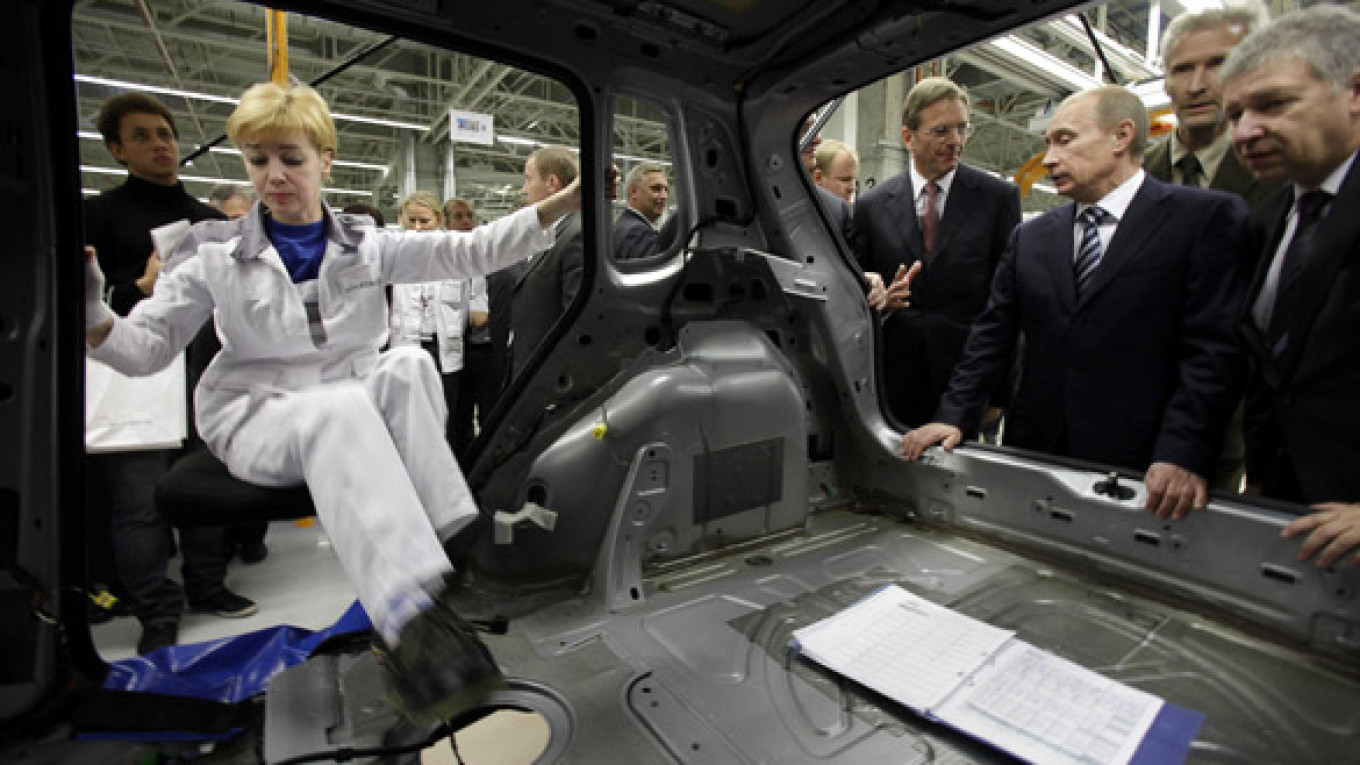KALUGA — Volkswagen Group will double production at its Kaluga plant and roll out a new model tailored for Russian drivers next year as it bets that demand will grow for budget cars, the company said Tuesday.
Volkswagen CEO Martin Winterkorn, who visited the plant with Prime Minister Vladimir Putin for the launch of the assembly of complete knockdown kits, said the Russian market would grow by 30 percent by 2018 to become one of the world’s top five markets with sales of 3.6 million cars.
Russian sales have halved in the first three quarters of this year after reaching a record 3.2 million vehicles in 2008.
The Kaluga plant, located 170 kilometers west of Moscow, aims to roll out 150,000 cars next year and use complete knockdown kits to produce five models, including the concept car developed especially for the Russian market.
Complete knockdown kits require workers to paint and weld locally instead of simply assembling vehicles. Currently, only the Volkswagen Tiguan and Skoda Octavia have been launched for complete knockdown assembly at the plant.
The new “limousine-sedan” model with a longer chassis for Russian drivers will premiere at the Moscow Motor Show next August, Winterkorn said.
The car, which has not yet been given a name, will be based on the Volkswagen Polo and cost about 440,000 rubles ($14,990), officials said.
Volkswagen, which opened the plant in late 2007, is a flagship investor that paved the way for other major foreign investors to enter the region, Kaluga Governor Anatoly Artamonov said. “It was the first and therefore a difficult project,” he said.
Putin, who earlier this month warned France’s Renault to invest in the struggling AvtoVAZ car giant or risk seeing its 25 percent stake diluted, lavished praise on the governor for defending foreign investors “like they are a Russian company,” thereby showing his commitment to “making the investor feel comfortable.”
Putin called the plant a model for international partnerships in the “difficult auto industry,” adding that he discussed potential problems for Volkswagen in Russia with German Chancellor Angela Merkel “during our talk about the problems with Opel.” Sberbank and Canada’s Magna recently placed a winning bid to take over General Motors’ Opel unit, which is based in Germany.
Putin seemed especially pleased about Volkswagen’s sponsorship of the 2014 Sochi Winter Olympics and the Russian national football team.
“This means we will win the Sochi Olympic Games together,” Putin said in German.
Volkswagen signed up to sponsor the Games last month, agreeing to provide 3,000 vehicles, most of which will be produced at the Kaluga plant, both before and during the event. Sochi 2014 head Dmitry Chernyshenko has put the value of the sponsorship at $100 million.
Chernyshenko, who was present at the plant Tuesday, said the Volkswagen cars used for the Olympics would be outfitted with Glonass navigation systems, the Russian version of GPS.
Enthusiastic speeches were also delivered Tuesday by the German Ambassador Walter Jürgen Schmidt and Czech Foreign Minister Jan Kohout, who said the plant was a sign that Skoda had made the right decision to team up with Volkswagen in the 1990s rather than stay independent.
Somewhat tarnishing the celebration of diplomacy and sports, Olympic champion figure skater Maria Butyrskaya went on stage with a dozen children from her skating school and recalled how she had beat German star Katarina Witt at the beginning of her career.
Along with the Russia-tailored car, the plant will start complete knockdown production of the Skoda Favia and one other model in 2010, said Jochem Heizmann, Volkswagen’s head of production.
Localization of all production is expected to be “over 30 percent” next year and will include seats, “some spare parts” and painting, said Volkswagen’s Russia director, Dietmar Korzekwa.
He said a decision to further localize would depend on developments on the Russian market because localizing requires a substantial investment in tools and instruments.
The decision to switch the Tiguan and Octavia to complete knockdown was based on their success in Russia, he said. For the same reason, Audi will not be switched to complete knockdown for the time being, company executives said.
The plant employs about 1,800 workers, which is expected to grow to 3,000 once production reaches capacity next year, and could eventually reach 6,000, Winterkorn said.
Volkswagen has invested more than 570 million euros ($853 million) in the plant and a total of 774 million euros into Russia, the company said in a statement.
Volkswagen sold 72,000 cars in the first nine months of 2009, putting it in third place with a share of 6.6 percent on the Russian market. The company’s share was 3.3 percent last year.
n At a separate meeting with the governor, Putin signed a decree transferring the ownership of the Kaluga airport from the federal to the regional government.
“I hope this will allow you to attract the necessary investment,” Putin said, RIA-Novosti reported.


